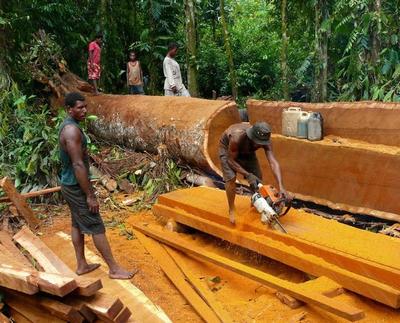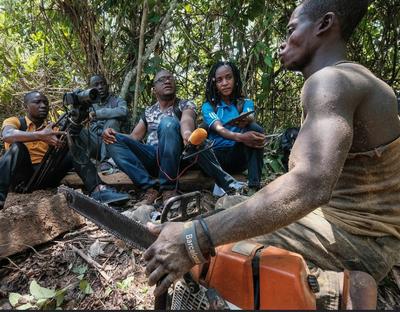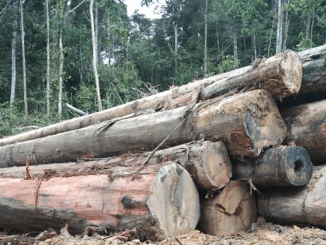
LYON, France, February 16, 2021 (ENS) – A decade of forestry crime operations, fighting the looting of natural resources such as timber and charcoal in some of the world’s poorest countries, has given the international police force, Interpol, some powerful tools to carry on the fight against its powerful adversaries. Al-Shabaab, a violent terrorist group responsible for major attacks in Somalia and Kenya, has been one of the main beneficiaries of the illegal charcoal trade.

Ten years ago Interpol set up a dedicated Environmental Security Programme. In a 10th-anniversary analysis released in late December, Interpol says that over the past decade its officers have seen “a shift in focus from the front line timber criminals to the conglomerates and organized crime groups behind the industry.”
The world’s police community has reacted by working together across the entire timber supply chain to disrupt criminal networks and the financial flows that enable forestry crime.
Worth almost US$152 billion a year, the illegal timber industry accounts for up to 90 percent of tropical deforestation in some countries and attracts the world’s biggest organized crime groups, Interpol says. It causes serious economic, environmental and social damage and fuels conflict in forest regions where criminal gangs compete.
“Wildlife and forestry crime is the world’s fourth-largest illegal trade – a lucrative illegal business with far-reaching and devastating consequences not just for the environment but also for society, public health and global economics,” said Interpol Secretary General Jurgen Stock.
Tax evasion, corruption, violent crime, fraud and money laundering, and hacking of government websites to obtain permits, are commonplace on the forestry crime landscape that Interpol describes.

This is no small deal. Interpol warns any visitor to its website, “Your home furnishings probably include at least one piece built from illegally gained wood and could be linked to firearms trafficking and even murder.”
From 2014-2018, Interpol’s “Amazonas” operations in South America saw almost 700 arrests, the seizure of over US$87 million worth of protected wood (100 million m3) and the confiscation of trafficking vessels and wood processing machinery.
Human encroachment into forested areas, driven by illegal logging and agricultural expansion, is increasing human contact with wildlife’s infectious diseases, the international police agency warns.
This drives the transmission of those diseases from wildlife to humans, particularly when the demolition of forests displaces disease-carrying species from the forest into urban areas.
Criminal forest fires aimed at freeing up land for agriculture and cattle can destroy the equivalent of one football field every six seconds for months on end, Interpol calculates.
As some of the world’s most prized woods disappear under the sawyer’s blade, the remaining woods are skyrocketing in value. The world’s most widely traded illegal wild product is rosewood, fetching up to US$50,000/m3 and increasing 700 times in value between the criminal logger and the end buyer.
Interpol Proud of Its Record: 10 Years, 10 Improvements in Policing Forest Crime
1. Greater police awareness: a decade of action has given police forces in 194 countries a firm grasp of Interpol’s intelligence analysis, operational and technological support capacity. It has helped the world’s police community to recognize the institutionalized global timber trafficking schemes enabled by high-level corruption and given front-line officers the knowledge and skills required to tackle them effectively.
Today, recognizing the serious impact of illegal timber trade, destination countries are actively tackling the crime area, initiating investigations even though the initial timber crime is actually committed in other parts of the world. More police forces are creating their own dedicated forestry crime units to address the organized crime networks behind timber crime.
2. Addressing emerging trends: tackling forestry crime is comparable to the global war against drugs – the crime and the criminals keep on adapting. Interpol has spent the past decade working closely with investigators across the globe, sharing ideas, techniques and information to identify patterns in the forestry sector. Trends include the detection of timber laundering throughout the production process and the laundering of illegal timber with legal timber during transport and processing.

3. Stronger operational capacity: 10 years of coordinating global law enforcement operations has enabled countries to collect intelligence, identify trends and risk indicators, and perform intelligence-led investigations at national, regional and global levels. Interpol has kept countries abreast of technological innovations such as the use of timber forensics and high-tech tools to remotely monitor and identify logging concessions and illegal logging sites.
4. All-inclusive investigations: Interpol strives to ensure police officers in all continents and at all levels focus on the broad organized crime networks rather than individual offenders. For the past decade, Interpol has provided tailored advice, mentoring, policing tools and training across the criminal justice chain, supporting investigations, prosecutions, adjudications and confiscations of criminal assets. This has boosted forestry crime investigations worldwide and triggered operations and asset recovery efforts, depriving criminal groups of illegally obtained money and proceeds of crime.
5. Stronger transnational cooperation: using Interpol’s secure global police communications network called I-24/7, police forces today fight forestry crime together, across borders, monitoring the global crime landscape and steering financial investigations to follow the money which drives organized crime. Cooperation between forestry officials, customs, border agents and the police has been crucial over the past ten years to tackling timber trafficking effectively. The main focus has been on tax fraud and corruption investigations against logging companies, plantations and the mills that work with organized crime networks.
6. Addressing the taboo head-on: corruption is one of the main factors that facilitate forestry crime. A decade of Interpol anti-corruption training – both online and in class – has enabled police forces, forestry investigators and forest law enforcement agencies on all continents to detect, investigate and prosecute corruption better, and deal with the challenges involved in doing so. Digital and mobile forensics for anti-corruption investigations are high on the agenda of each training course, in addition to best practices for detecting corruption in the forestry sector, particularly in relation to timber contracting and licensing.
7. Tailored capacity building: Interpol has spent a decade strengthening national investigative and operational police capacities through regular training schemes delivered to the wider range of timber crime stakeholders. We have been building capacity at frontline, investigation, prosecution and border levels of forestry enforcement. This has led to more investigations and prosecutions linked to logging, trading, processing, manufacturing, exporting or importing illegally gained wood products. We have built multiple national task forces to ensure enforcement of timber laws and regulations.
8. Publications: regular publication of globally recognized law enforcement manuals, used today by law enforcement across the world to tackle illegal forestry comprehensively. The last 10 years have also seen the publication of operational and tactical analysis reports on forestry crime.
9. Interpol Notices: Many Interpol Notices have been issued over the past decade for fugitives wanted either for prosecution or to serve a sentence related to forestry crime.
10. Crime convergence: Interpol has had a decade’s worth of experience detecting links between forestry crime and other serious organized crime, which acts as an enabler for fraud, corruption, tax evasion and money laundering.
Copyright Environment News Service (ENS) 2021. All rights reserved.



